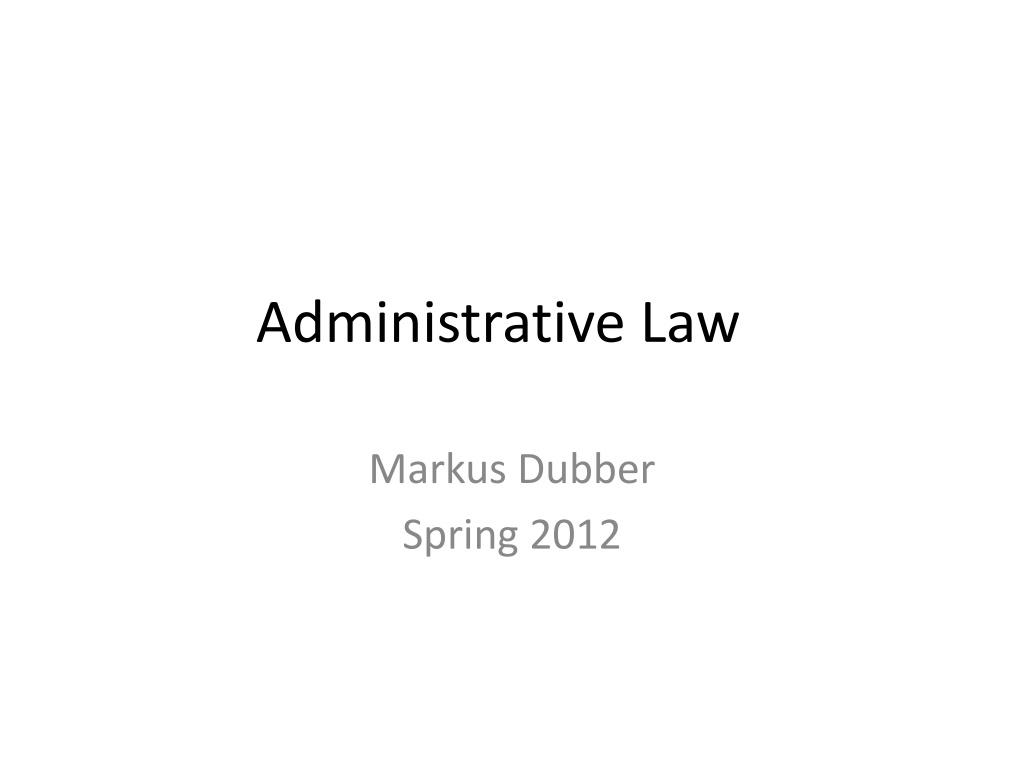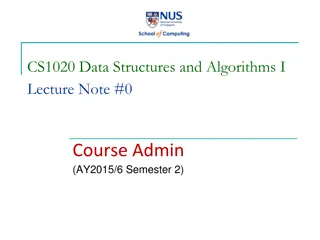Legal Cases and Guidelines in Administrative Law
Cases involving assault, purse snatch attempts, and pecuniary losses under the Compensation for Victims of Crime Act are discussed. Issues of discretion, policy adoption, and guideline application in Board decisions are examined.
Download Presentation

Please find below an Image/Link to download the presentation.
The content on the website is provided AS IS for your information and personal use only. It may not be sold, licensed, or shared on other websites without obtaining consent from the author. Download presentation by click this link. If you encounter any issues during the download, it is possible that the publisher has removed the file from their server.
E N D
Presentation Transcript
Administrative Law Markus Dubber Spring 2012
CICB: Cogan (Ont Divisional Ct 92) Claim July 30, 89: assault at home (pushed down flight of stairs) June 19, 90: purse snatch attempt on street Comp for Victims of Crime Act s. 23: Board decision final except that an appeal lies to the Divisional Court from any decision of the Board on any question of law s. 19(1) The amount awarded by the Board to be paid in respect of the injury or death of one victim shall not exceed, (a) in the case of lump sum payments, $25,000; and (b) in the case of periodic payments, $1,000 per month, and where both lump sum and periodic payments are awarded, the lump sum shall not exceed half of the maximum therefor prescribed in clause (a). (2) The total amount awarded by the Board to be paid to all applicants in respect of any one occurrence shall not exceed, (a) in the case of lump sum payments, a total of $150,000; and (b) in the case of periodic payments, a total of $250,000. (4) For the purposes of this section, the Board may deem more than one act to be one occurrence where the acts have a common relationship in time and place. Illegal self-fetter: $25,000 lid Claimed loss: $70,510.00 ( well beyond the admissible allowed ) $25,000 per victim vs. per crime per victim THAT Mrs. Tait [chair] appeared to be very adversarial, particularly when Mr. Hill stood by his submission. Mrs. Tait told Mr. Hill that Board policy prevented her from doing this. THAT the member, Piara Sahota, seemed at one point to agree with Mr. Hill's submission, and this seemed to upset Mrs. Tait who said to Piara Sahota, through her teeth, "policy, Mr. Sahota, policy".
CICB: Leung (Ont Divisional Ct 95) Guideline: Board approach used in calculating pecuniary losses sustained under Section 7(1)(b) In calculating pecuniary loss under section 7(1)(b), in a manner which treats all applicants with long or short term injury related disabilities in the same fashion, the Board shall generally multiply the number of usual working days contained in the period of disability (to a maximum of 5 days per week and twenty days per month) by the amount of $50.00 and will subtract from that sum any employment-related benefits, indemnity or compensation paid or payable pertaining to that period and any income received or to be received from alternate employment for that period. Unlawful fetter? [Evans in de Smith s Judicial Review of Admin Action 4thed.!] A tribunal entrusted with a discretion must not by the adoption of a fixed rule of policy, disable itself from exercising its discretion in individual cases. pursuit of consistency at the expense of the merits of individual cases Using discretion not to use discretion not enough discretion! Sentencing guidelines YES! Although the word "generally" is employed in the guideline, the effect of the guideline is to encourage an arbitrary and even capricious treatment of victims of crime. It cannot be argued that this type of guideline in any way reflects the intention of the legislature.
Leung 2 BUT: no reasons! Separate ground of appeal! No problem only required to give reasons if requested by a party !! Leung never asked for reasons!! b/c no reasons, unclear why the Board limited wage loss award to $2,000! Therefore, insufficient evidence that Board applied guideline Therefore, insufficient evidence that Board in fact fettered its discretion by applying the guideline Given the material that was before the Board, particularly in relation to the medical evidence, it cannot be said that the Board exercised its discretion unreasonably in limiting the wage loss award to $2,000 quite apart from the application of the wage loss guideline. It would have been desirable for the Board to have given some reasons for limiting the award for wage loss in order to avoid the victim feeling that he has been the victim of an arbitrary decision . !!
CICB: Pitters (Ont Divisional Ct 96) Gun play results in serious injury Charged with use, possession, negligent assault Pleads guilty to possession; 2 months No compensation b/c accident, not crime of violence Is possession (rather than use) a crime of violence? Balance of probabilities (1) Finding of accident Not cognizable on appeal, not question of law (2) Interpretation of crime of violence (s. 5(4)) The meaning of "a crime of violence must be ascertained from s. 5(a) of the Act, and the general principles of statutory construction No definition in definitional section Context, purpose
Crime of violence? Everyday people/plain meaning Violence is used in a descriptive sense to designate the type of crime that must be proven to permit the Board to consider the exercise of its discretion to award compensation. A "crime of violence" is a crime of a violent kind. In everyday usage, "violence" connotes the exercise of a physical force so as to inflict injury or damage to persons or property. "Violent" includes intense, vehement, very strong or severe. It is characterized by the doing of harm or injury. It includes impetuous. In ordinary speech, "violent" includes, but is not synonymous with the use of physical force. Legislature didn t limit plain meaning (unlike elsewhere) Intent or recklessness re: death/other harm The Brits have a hard time defining crime of violence, too Appears nowhere in Criminal Code Luckily, we don t have to mark the limits of the inscrutable phrase a crime of violence, b/c s. 5(a) provides compensation for injuries resulting from: the commission of a crime of violence constituting an offence against the Criminal Code (Canada), including an offence under section 86
Crime of Violence: The Resolution 86. (2) Every one who, without lawful excuse, uses, carries, handles, ships or stores any firearm or ammunition in a careless manner or without reasonable precautions for the safety of other persons (a) is guilty of an indictable offence and liable to imprisonment ; or (b) is guilty of an offence punishable on summary conviction. Mens rea requires marked departure from standard of care of reasonable person under circumstances: B.I.N.G.O. Therefore crime of violence compensability Don t fetter yourself confidence, confidence! Under the legislation, it is the Board that is required to decide whether a relevant offence, "a crime of violence", has taken place. The matter is not determined by the initial categorization of the offence by police investigators. It is not decided by the charge(s) laid against an offender. It is not resolved by the charge(s) upon which the prosecutor chooses to proceed to trial or other disposition. It is not pre-empted by the decision of the criminal court. It is for the Board to decide the matter, on the evidence adduced before it, and upon proper construction of its statutory mandate.
Masakeyash (Ont Divisional Ct 06) Child s play; slingshot; stone in the eye; infant offender (and victim on behalf of Jamie Skunk ) Board: no crime of violence b/c no intent CICB: alleged offender incapable of criminal responsibility (infant) Standard of review!!! (correctness) s. 13 Criminal Code: No person shall be convicted of an offence in respect of an act or omission on his part while that person was under the age of twelve years. s. 16(2) CICB Act: Even though a person for any reason is legally incapable of forming criminal intent, the person shall, for the purposes of this Act, be deemed to have intended an act or omission that caused injury or death for which compensation is payable under this Act. CICB: 16(2) trumps 13 CC; irrebuttable presumption of intent (mens rea) for infant upon proof of actus reus Ct: 13 not limited to intent, but blanket exemption from criminal accountability (even in the presence of intent ); moral innocence (children s incapacity to fully understand the nature of their conduct or the risks and dangers inherent in their actions or that their conduct is blameworthy )
Ad absurdum There are practical difficulties in the interpretation of the Act put forward by appellant's counsel. Any violent act by a child would be deemed to be a crime, not an accident, and compensation would be payable, while the same act committed by an adult might amount to only civil negligence or pure accident. This would be contrary to the intention of the Act to compensate for crimes of [adult?] violence. [?] [vs. torts?] Theoretically at least, compensation would be awarded not only for the usual schoolyard confrontations and accidents but also as a result of innocent aggression by the youngest of infants. The results of a compensation order made in relation to an infant would not necessarily be benign. The infant would carry the stigma of having committed a crime of violence and by s. 26(2) of the Act the Board may pursue a subrogated proceeding against the "offender" to recover the compensation paid and the costs. I conclude it was not the intent of the legislature in enacting s. 16(2) to displace the effect of Criminal Code, s. 13 that children under 12 are incapable of committing crimes. Compensation, therefore, may not be awarded as a result of the conduct of children under the age of 12 years. - what, then is the point of CIBC 16(2)? Intoxication?
Dalton (Ont Div Ct 82) Woman meets men in bar; gets in van; sexual advances; pushed out; serious injuries s. 17(1) In determining whether to make an order for compensation and the amount thereof, Board shall have regard to all relevant circumstances, including any behaviour of the victim that may have directly or indirectly contribute to his injury or death. formerly: the Board may have regard to all such circumstances as it considers relevant In view of the fact that the applicant had consumed a fair amount of alcohol whereby her judgment was impaired and that the two unknown alleged offenders had also had a considerable amount to drink, in the Board's opinion, it was imprudent to go into a van with two unknown inebriated men and the Board concludes that the applicant was the author of her own misfortune ... Review of law only, not fact (e.g., of drunkenness, familiarity, politeness) 17(1) errors: failure to consider all relevant circumstances, to wit, severity of injuries Victim contributing, but not sole, cause of her misfortune
Skerget (Ont Div Ct 77) Acquitted of assault Neither prosecution nor conviction required The legislation is understandably silent as to the effect to be given to an acquittal on a particular charge because of the fact that neither prosecution nor conviction of an offence is a necessary prerequisite to compensation evidence may be adduced different from that adduced in the criminal Court Rules of evidence, what rules of evidence? Burden of proof balance of probabilities vs. beyond reasonable doubt
Jane Doe (Ont. Div. Ct 95) CICB version of R. v. Cuerrier [1998] 2 S.C.R. 371 (fraudulently obtained consent) Tried for criminal negligence causing bodily harm; dies of AIDS Reduced award from max 25 to 15k 17(1) again: In determining whether to make an order for compensation and the amount thereof, Board shall have regard to all relevant circumstances, including any behaviour of the victim that may have directly or indirectly contribute to his injury or death. Atty Gen (for victims): contributory behaviour = contributory negligence Foreseeability Unforeseeability of dishonesty re: HIV (citing Dalton) Standard of care No flagrant, reckless or foolish disregard for safety No evidence re: knowledge of dangers of contracting AIDS in late 80s/earler 90s Causation Offender sole cause Failure to consider all relevant circumstances Board considered moral code (in relying on sex after a brief acquaintance )
Jane Doe 2 CICB No right to compensation; untrammeled jurisdiction unless arbitrary Unreviewable issue of fact Ct: Victim compensation is not tort law Negligence analysis inapposite Whether the board erred in law in finding that the behaviour of the victims directly or indirectly contributed to their injuries Demanded unreasonably high standard Public awareness of risk in 1991? Actual awareness? Overwhelming consequences; proportionality of O s conduct vs. V s lack of prudence In our opinion the board demonstrated a clear and identifiable error of fact in its appreciation of the evidence which is tantamount to a material and identifiable error of law.
Spade Ont. Div. Ct. 90 Marjorie Spade tries to stop fight b/w two men; injured CICB: no crime of violence as envisaged by s. 5(a) Correct? no Jobidon [!] (after board decision): no consent to assault w/ intent to harm or actual harm Participants in fights committed assault within the provisions of the Criminal Code and in the process, the applicant was injured as envisaged by s. 5(a) 5. Where any person is injured or killed by any act or omission in Ontario of any other person occurring in or resulting from (a) the commission of a crime of violence constituting an offence against the Criminal Code
Manson Ont. Div. Ct. 89 Drinking, Key shows off gun, playing craps at 2:45am, Pieluch and Key argue, Key takes money and walks off, Manson tells Key he s wrong, Key holds gun to Manson s head and threatens to kill him, Manson insists, and again Key shoots him in the arm CICB: no award 17(1) (contribution) Under either 5(a) or 5(c) (prevention) Court No right to compensation Distinguishes Dalton, where the victim could not have expected injury suffered flagrant, reckless, or foolish disregard for his own safety It is not necessary to find the appellant culpable in the sense of wrongdoing [nor] to find him the complete author of his own misfortune (contributing cause enough)
Fregeau Ont Div Ct 73 Firefighter w/ severe injuries No award because dismissal of attempted insurance fraud Failure to consider underlying arson as crime of violence Quashed, regrettably To fail to consider the only material evidence of crime was an error of law .
Stone Ont Div Ct 82 No award for drug dealer The information before the Board could reasonably have led the Board to think that the assault was an incident of the carrying out, by the appellant, of activities in the illicit drug trade 17(1)!
Sheehan Ont Div Ct 73 Sheehan Assault by fellow prisoner 70 Assault during Kingston riots 71 4 other inmates & 1 guard Denied Criminal behaviour: but for their own prior criminal activity Irrelevant b/c unconnected Federal (not provincial) prisons Exclusion of federal prison inmates from crime victim compensation; not legislative intent Board decision overturned Irrelevant considerations Even ex gratia payment, without legal obligation, subject to judicial review
Sheehan 2 Ont Ct Appeal [!!] 75 Limited judicial review under [old] statute [former] 3. the decision of the Board is final and conclusive for all purposes [current] 23. a decision of the Board is final except that an appeal lies to the Divisional Court from any decision of the Board on any question of law [former] 5. In determining whether to make an order for compensation and the amount thereof, the Board may have regard to all such circumstances as it considers relevant, including any behaviour of the victim that directly or indirectly contributed to his injury or death [current] 17(1). In determining whether to make an order for compensation and the amount thereof, the Board shall have regard to all relevant circumstances, including any behaviour of the victim that may have directly or indirectly contributed to his or her injury or death Failure to consider all and only relevant considerations or considerations beside the point [unless factors patently irrelevant ] Affirm Board decision; overturn Div Ct!























